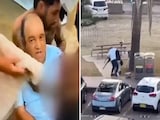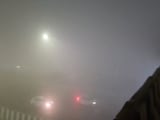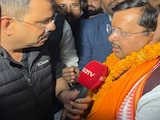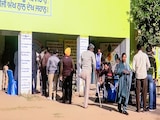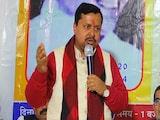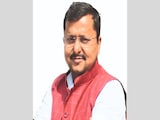Ending special status to Jammu and Kashmir under Article 370 and splitting it into two union territories is among the biggest decisions taken by Prime Minister Narendra Modi in his second term. In a record-setting session of Parliament, the decades-old "temporary" provision came to an end as the government's move was cleared by both houses.
The decision on Article 370 has been welcomed by many, but there has also been strong criticism by opposition parties over the manner in which it was done. News agency IANS spoke with the prime minister on the Kashmir move.
Q) There seems to be an uneasy calm at the moment. Why do you think the people of J&K will stand with you?
PM Modi: "Please see the list of people who have opposed the decisions about Kashmir - the usual vested interest groups, political dynasties, those who sympathise with terror and some friends in the Opposition. The people of India, irrespective of what their political preference, have supported the steps taken in Jammu, Kashmir and Ladakh. This is about the nation, not politics. The people of India are seeing that tough but essential decisions that were earlier assumed to be impossible are becoming a reality."
As life limps back to normalcy in the Valley, PM Modi has a clear view of the road ahead.
He explains how these provisions actually harmed India. "It is now clear to everyone how Articles 370 and 35(A) fully isolated Jammu, Kashmir and Ladakh. The status quo of seven long decades clearly could not fulfill people's aspirations. Citizens were kept away from the fruits of development. The greatest casualty was the lack of any proper economic avenues to increase earnings. Our approach is different - instead of the vicious cycle of poverty, the people need more economic opportunities. For years, intimidation ruled the roost. Let us now give development a chance," he said.
During the interview, Prime Minister Modi further explained: "My sisters and brothers of Jammu, Kashmir and Ladakh always wanted a better future, but Article 370 did not enable it. There was injustice against women and children, Scheduled Tribes as well as Scheduled Caste communities. And, most importantly, the innovative zeal of the people of Jammu, Kashmir and Ladakh was not harnessed. Now, from BPOs to startups, from food processing to tourism, many industries can avail of investment and create opportunities for the local youth. Education and skill development will also bloom," he said.
"I want to clearly assure my sisters and brothers of Jammu, Kashmir and Ladakh that these regions will develop as per the wishes of local people, their dreams and ambitions. The growth of these regions will first and foremost be powered by those belonging to these regions. Articles 370 and 35(A) were like chains that kept people tied. These chains are now broken, people have been unshackled from such dominance and they will now shape their own destiny," the prime minister said.
For those opposing the decisions on Jammu and Kashmir, PM Modi asked them to answer one basic question: What is their defence for continuing with Articles 370 and 35A?
"They would have no answer to this question. And, these are the same people who are used to protesting when it comes to anything that helps common people. There is a project to provide water to people, they will oppose it. There is a railway track being built, they will oppose that. Their heart only beats for Maoists and terrorists who have only bullied common citizens. Today, every Indian is fully standing with the people of Jammu, Kashmir and Ladakh and I am confident they will stand with us in the aim to boost development and bring peace," PM Modi said.
He further said that "Kashmir has never witnessed such a strong commitment in favour of democracy. Remember the turnout during the Panchayat elections? The people voted in large numbers and did not get cowed by bullying. In November and December of 2018, there were 35,000 sarpanches elected and the turnout in the panchayat elections was a record 74 per cent. There was no violence during the panchayat elections. Not a drop of blood was shed in poll violence. This, when the main parties there were lukewarm to this entire exercise. It is very satisfying that now panchayats are back at the forefront of furthering development and human empowerment. Imagine, for so many years those in power did not find it prudent to work towards strengthening panchayats. And remember, they gave great sermons on democracy, but the words never led to action."
"It surprised and saddened me that 73rd Amendment did not apply to Jammu and Kashmir. How could such injustice be tolerated? It was in the last few years that panchayats in Jammu and Kashmir got more powers to work towards people's progress and various subjects transferred to panchayats under the 73rd amendment were transferred to panchayats of Jammu and Kashmir," he said.
"Now, I have requested the governor to work towards organising block panchayat elections too. Recently, the Jammu and Kashmir administration did the 'Back to Village' programme, where the entire government machinery went to the people instead of vice versa. They went just to mitigate people's problems. The common citizens appreciated the programme. The results of these efforts are for all to see. Swachh Bharat, rural electrification and other such initiatives are reaching the grassroots. This is what democracy truly is," PM Modi said.
In his closing remarks, PM Modi reiterated that, "I have assured people that elections in Jammu and Kashmir will continue and it is the people of these regions only who will represent the larger public. Yes, those who ruled Kashmir thinking it is their divine right to do so will dislike democratisation and peddle incorrect narratives. They do not want a self-made, younger leadership to emerge. These are the same people whose own conduct in the 1987 elections has been suspect. Article 370 has helped the local political class avoid transparency and accountability. Its removal will only empower democracy even more."

